We may not have the course you’re looking for. If you enquire or give us a call on +44 1344 203 999 and speak to our training experts, we may still be able to help with your training requirements.
Training Outcomes Within Your Budget!
We ensure quality, budget-alignment, and timely delivery by our expert instructors.
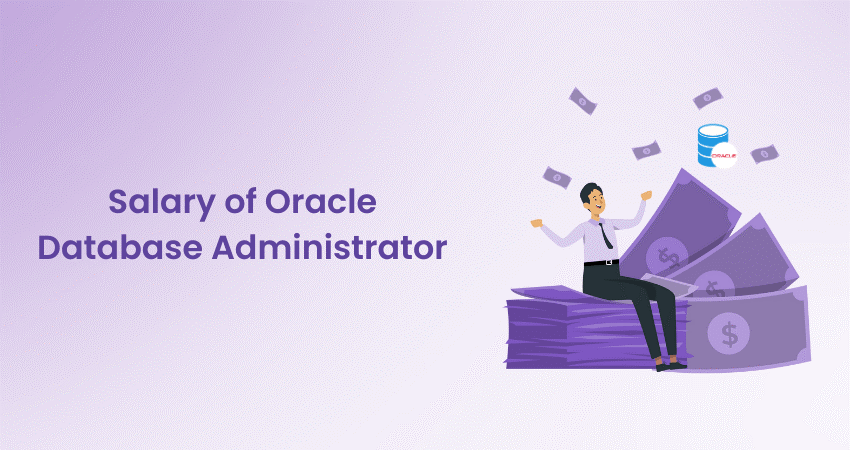
Are you ready to dive into the world of Oracle Database Administration and unlock the secrets to a lucrative career? Imagine commanding a high salary that reflects your expertise in managing complex database systems. The role of an Oracle Database Administrator is not just about data; it's about shaping the digital backbone of businesses worldwide. The competitive Salary of Oracle Database Administrator is a testament to the critical role they play in the IT industry.
What exactly does an Oracle DBA do, and how much can you earn as an Oracle DBA? Understanding the complexity of the work, the industry demand, and the pathways to career growth is key. Let’s embark on a journey to uncover the Salary of Oracle Database Administrator and pave your way to a rewarding career in this dynamic field.
Table of Contents
1) Understanding the Role of a DBA
2) Responsibilities of Oracle Database Administrator
3) Oracle Database Administrator Salary based on job roles
4) Oracle Database Administrator Salary based on location
5) Oracle Database Administrator Salary based on experience level
6) Factors Influencing the Salary of Oracle DBAs
7) Tips for Career Growth and Salary Advancement
8) Conclusion
Understanding the Role of a DBA
A Database Administrator (DBA) plays a crucial role in managing an organisation's database environment. Their responsibilities include ensuring data security, optimising database performance, and implementing backup and recovery plans.
DBAs also collaborate with developers to design efficient database structures and troubleshoot issues. They monitor database activity, implement upgrades, and ensure compliance with data protection regulations.
Additionally, DBAs work to improve database efficiency, streamline processes, and support business objectives. Their expertise in database technologies and understanding of organisational needs make them vital in maintaining data integrity and accessibility.
Responsibilities of Oracle Database Administrator
The following are the responsibilities of Oracle Database Administrator:
a) Installing, configuring, and upgrading Oracle database systems
b) Monitoring database performance and optimising database operations
c) Creating and maintaining database backups
d) Troubleshooting database issues that arise during daily operations
e) Collaborating with developers to design efficient database structures
f) Implementing and maintaining data integrity and backup policies
g) Planning and implementing database upgrades and patches
h) Keeping up to date with Oracle database technology and industry trends
i) Providing technical support and guidance to database users and stakeholders
Oracle Database Administrator Salary Based on Job Roles
Let’s break down the Oracle Database Administrator salaries based on job roles:
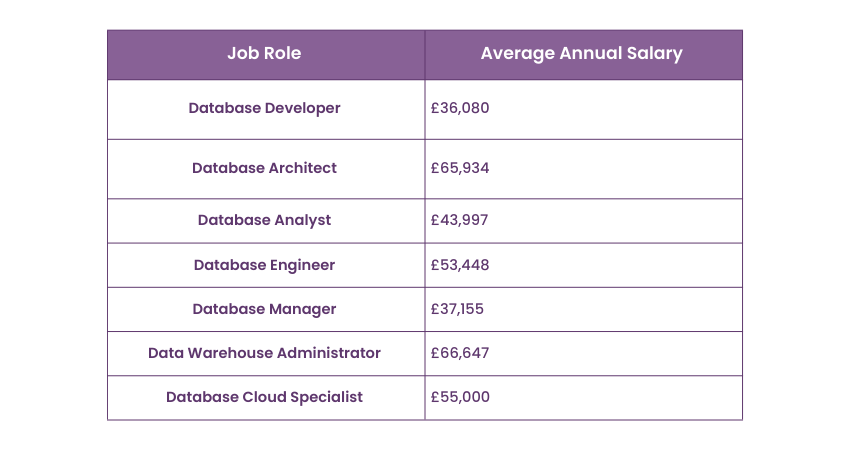
Source: Payscale
Database Developer:
a) A Database Developer is accountable for designing and implementing database systems.
b) They write code, troubleshoot issues, and ensure that the databases run efficiently.
c) Database Developers earn an average annual pay of £36,080.
Database Architect:
a) A Database Architect designs the structure of a database, including its schema and related components.
b) They are involved in planning and development to ensure the database meets the needs of users.
c) Database Architects earn an average annual pay of £65,934.
Database Analyst:
a) A Database Analyst analyses and evaluates the data needs of users.
b) They maintain databases and improve database performance.
c) Database Analysts earn an average annual pay of £43,997.
Database Engineer:
a) A Database Engineer works on the technical aspects of database design and maintenance.
b) They develop and implement database solutions.
c) Database Engineers earn an average annual pay of £53,448.
Database Manager:
a) A Database Manager oversees the operations of database teams.
b) They manage the database staff and ensure that the databases are secure and accessible.
c) Database Managers earn an average annual pay of £37,155.
Data Warehouse Administrator:
a) A Data Warehouse Administrators manages and maintains data warehouses.
b) They ensure that the data is clean, organised, and retrievable for analysis.
c) Data Warehouse Administrator earn an average annual pay of £66,647.
Database Cloud Specialist:
a) A Database Cloud Specialist focuses on cloud-based database solutions.
b) They work with cloud services to deploy and manage databases in the cloud.
c) Database Cloud Specialist earn an average annual pay of £55,000.
Enhance your expertise with top-tier Oracle Training to achieve professional growth and certification!
Oracle Database Administrator Salary Based on Location
Let’s break down the Oracle Database Administrator salaries based on location:
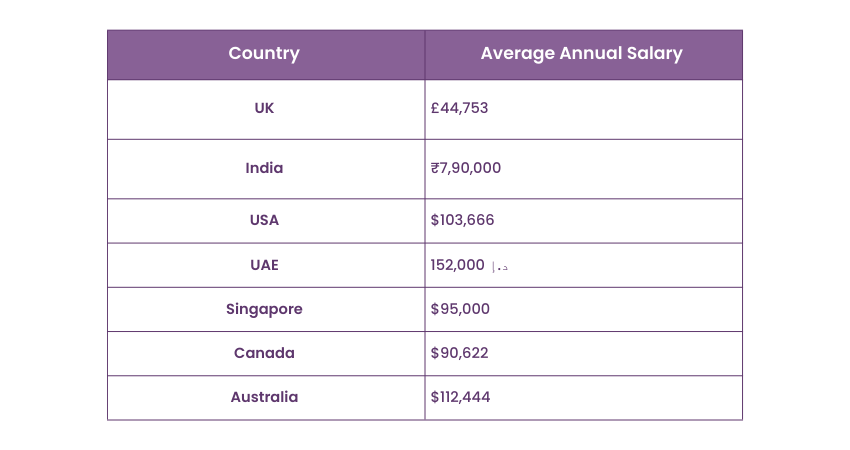
Source: Payscale
United Kingom (UK):
a) An Oracle Database Administrator in the UK earns an average of £44,753 per year.
b) This reflects the competitive IT market and cost of living in the UK.
India:
a) The average annual salary in India for this role is ₹7,90,000.
b) The figure is lower compared to Western countries, which can be attributed to the different economic conditions and currency value.
United States of America (USA):
a) In the USA, an Oracle Database Administrator’s salary is quite high, averaging at $103,666 annually.
b) This is due to the strong demand for IT professionals and the higher cost of living, especially in tech hubs.
United Arab Emirates (UAE):
a) The average salary in the UAE is د.إ 152,000.
b) Tax-free income and the growing tech industry in the region contribute to this salary level in many cases.
Singapore:
a) In Singapore, the average salary for an Oracle Database Administrator is around $95,000 per year
b) This indicates the country’s robust economy and its status as a financial and tech hub in Asia.
Canada:
a) Canadian Oracle Database Administrators earn an average of $90,622 annually.
b) Canada’s growing tech sector and its need for skilled IT professionals influence this salary range.
Australia:
a) Down in Australia, the average salary is $112,444 per year.
b) Australia’s high standard of living and the demand for skilled workers in the IT sector contribute to this higher salary.
Elevate your DBA skills with our Oracle Database DBA Performance Tuning & Management Training – Sign up today!
Oracle Database Administrator Salary Based on Experience Level
Let’s break down the Oracle Database Administrator Salaries based on experience level:
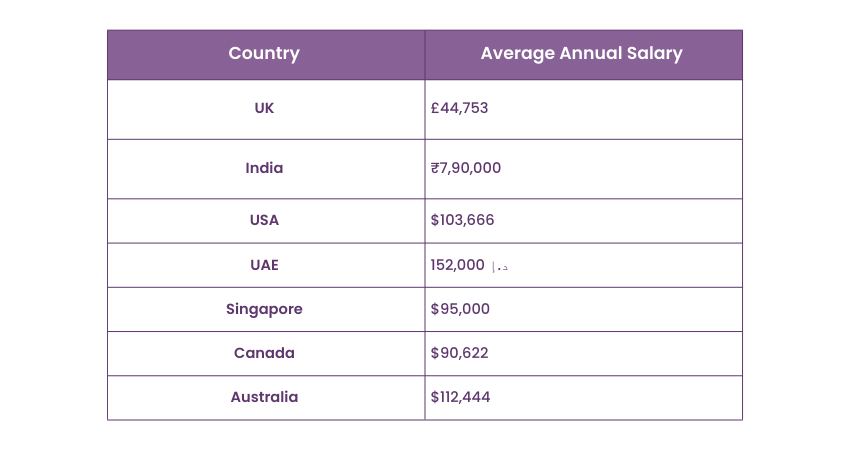
Source: Payscale
Entry-level:
a) At the beginning of their career, an Oracle Database Administrator can expect to earn around £36,421 per year.
b) This is when they are just starting out and are likely learning the ropes of managing databases.
Mid-level:
a) With more experience and responsibility, a mid-level Oracle Database Administrator’s salary increases to about £42,551 annually.
b) At this stage, they would have a few years of experience and be taking on more complex tasks.
Experienced:
a) An experienced Oracle Database Administrator with leadership roles earns an average of £60,000 annually, reflecting their expertise and responsibility.
b) This reflects their expertise and the value they bring to an organisation.
Unlock your potential and master Oracle Database 18c Administration with our expert-led Oracle Database 18c Administration Training!
Factors Influencing the Salary of Oracle DBAs
The Salary of Oracle Database Administrators can vary based on several key factors that impact their market value and earning potential. Therefore, it’s essential to understand these factors for both aspiring professionals and current DBAs looking to negotiate better compensation packages. Let's explore the primary elements that influence the Salary of DBAs:
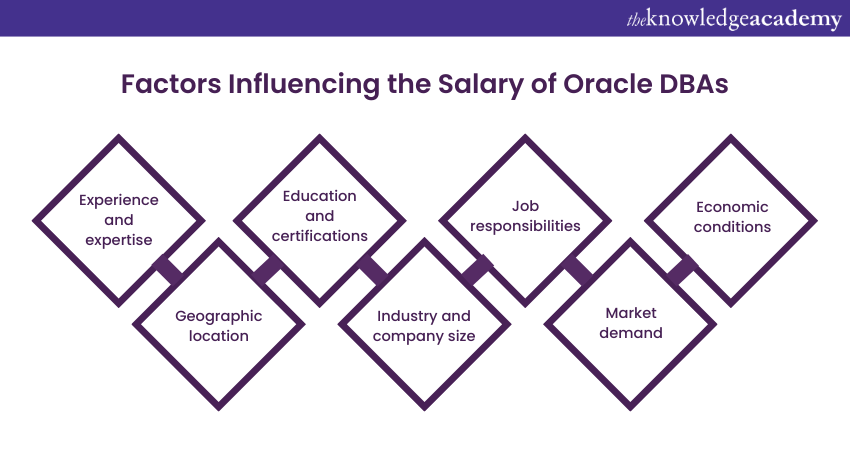
1) Experience and Expertise: One of the most significant factors affecting the Salary of DBAs is their level of experience and expertise in the field. DBAs with a proven track record of successfully managing complex Oracle Database Systems and handling critical issues are highly sought after by employers. Moreover, professionals with several years of hands-on experience typically command higher salaries than entry-level DBAs.
2) Geographic Location: The location of the job is also vital in determining the Salary of Oracle DBAs. Salaries can significantly differ from one region to another due to variations in the cost of living and demand for skilled professionals. Major tech hubs or cities with a high concentration of businesses often offer higher salaries to compensate for the increased living expenses.
3) Education and Certifications: The educational background and relevant certifications of an Oracle DBA can significantly impact their earning potential. Advanced degrees in related fields, along with industry-recognised certifications like Oracle Certified Professional (OCP) and Oracle Certified Master (OCM) can enhance a DBA’s marketability. This additional expertise often leads to commanding higher salaries.
4) Industry and Company Size: The industry in which an Oracle DBA works can influence their salary. Sectors such as finance, healthcare, and technology tend to offer higher compensation due to the critical nature of data management in these domains. Additionally, the size of the employing company also matters, as larger organisations often have more extensive and complex database systems. They necessitate skilled DBAs and potentially offer higher salaries.
5) Job Responsibilities: The scope and job responsibilities can also influence the Oracle DBAs Salary. Those who take on additional roles, such as data security management, performance tuning, or database design, may be eligible for higher pay. Furthermore, professionals who can handle multiple database platforms, in addition to Oracle, may have a competitive advantage in the job market.
6) Market Demand: The overall demand for Oracle DBAs in the job market is also crucial in salary determination. If there is a shortage of skilled DBAs in a particular region or industry, companies may propose more competitive salaries to attract and retain top talent.
7) Economic Conditions: The prevailing economic conditions of a country or region can influence salary trends for all professions, including Oracle DBAs. During economic downturns, salary increments may be more conservative, while in times of economic growth, salaries may rise more rapidly.
Understanding these dynamics enables DBAs to make informed career decisions, negotiate better compensation, and position themselves for success in the evolving IT industry. Staying updated with industry trends and enhancing expertise can lead to a rewarding Oracle Database Administration career.
Unleash the full potential of Oracle Database 12c with our Oracle Database 12c: Administration Training – sign up now!
Tips for Career Growth and Salary Advancement
For aspiring and existing DBAs looking to enhance their careers and increase their earning potential, the following tips can be valuable. Let’s take a look at them below:

1) Continuous Learning: The field of technology is continually evolving, and staying updated with the latest developments is crucial for career growth. Engage in continuous learning by attending workshops, webinars, and industry conferences. Pursue advanced certifications like Oracle Certified Professional (OCP) and Oracle Certified Master (OCM) to enhance your skills and marketability.
2) Specialisation: Consider specialising in a particular area of Database Administration that aligns with your interests and career goals. Specialising in a specific area like performance tuning, data security, cloud database management, or data warehousing can distinguish you from other Database Administrators. This expertise can lead to new career opportunities and higher salary potential.
3) Networking: Building a strong professional network within the industry is essential for career growth. Attend IT events, join online forums, and connect with peers and mentors in the field. Networking can provide precious insights into industry trends, job openings, and potential career paths.
4) Seek Challenging Projects: Look for chances to work on intriguing projects that allow you to apply and expand your skills as a DBA. Taking on complex tasks and successfully completing them will showcase your abilities and make you more valuable to employers.
5) Demonstrate Leadership Skills: Developing leadership skills is essential for advancing to higher-paying roles. Take the initiative, mentor junior DBAs, and actively participate in team projects. Demonstrating your ability to lead and collaborate effectively will make you an attractive candidate for senior positions.
6) Soft Skills Development: In addition to technical expertise, honing your soft skills is equally important. Effective communication, problem-solving, and teamwork are qualities that employers value in DBAs. Strong interpersonal skills can lead to better collaboration with other teams, furthering your career prospects.
7) Consider Higher Education: Pursuing a master's degree or higher education in a related field can provide a competitive edge in the job market. Advanced degrees demonstrate your commitment to learning and can lead to higher-paying roles in management or research.
8) Stay Informed About Industry Trends: Keep yourself updated with the newest trends and technologies in Database Administration. Being knowledgeable about emerging tools and techniques can make you more valuable to employers seeking modern solutions for their database management needs.
9) Negotiate Strategically: When considering new job offers or salary discussions, negotiate strategically based on your skills, experience, and the market demand for DBAs. Conduct research on industry salary benchmarks to support your negotiations effectively.
10) Update Your Resume and Online Presence: Ensure that your resume and online professional profiles, such as LinkedIn, are up-to-date and accurately reflect your accomplishments and skills. A well-presented online presence can attract recruiters and potential employers, leading to better career opportunities.
Conclusion
The Salary of Oracle Database Administrator is not just a number; it's a reflection of dedication and expertise in shaping the digital landscape. By accepting challenges and seizing opportunities for growth, DBAs can chart a course towards a rewarding and fulfilling career in Database Administration. Stay updated with industry trends to maximise your potential.
Master Oracle Database 19c administration and advance your career - join our Oracle Database 19c Administration Training now!
Frequently Asked Questions

According to Payscale, the highest pay for an Oracle Database Administrator (DBA) is £60,000, while the lowest pay is £34,000.

Oracle Database Administrators (DBAs) can increase their salary by gaining advanced certifications and specialising in niche areas. Additionally, they should continuously update their skills and network. Seeking challenging projects that demonstrate their expertise and leadership abilities also helps.

The Knowledge Academy takes global learning to new heights, offering over 30,000 online courses across 490+ locations in 220 countries. This expansive reach ensures accessibility and convenience for learners worldwide.
Alongside our diverse Online Course Catalogue, encompassing 17 major categories, we go the extra mile by providing a plethora of free educational Online Resources like News updates, Blogs, videos, webinars, and interview questions. Tailoring learning experiences further, professionals can maximise value with customisable Course Bundles of TKA.

The Knowledge Academy’s Knowledge Pass, a prepaid voucher, adds another layer of flexibility, allowing course bookings over a 12-month period. Join us on a journey where education knows no bounds.

The Knowledge Academy offers various Oracle Training, including Oracle Database 12c: Administration, Oracle Database 18c Administration Training and Oracle Database 12cR2, 18c And 19c New Features For Administrators. These courses cater to different skill levels, providing comprehensive insights into Becoming an Oracle DBA.
Our IT Infrastructure & Networking Blogs cover a range of topics related to Oracle, offering valuable resources, best practices, and industry insights. Whether you are a beginner or looking to advance your Infrastructure and Networking skills, The Knowledge Academy's diverse courses and informative blogs have got you covered.
Upcoming IT Infrastructure & Networking Resources Batches & Dates
Date
 Oracle Database 19c Administration Training
Oracle Database 19c Administration Training
Mon 6th Jan 2025
Mon 3rd Mar 2025
Mon 21st Jul 2025
Mon 8th Sep 2025
Mon 10th Nov 2025
Mon 8th Dec 2025







 Top Rated Course
Top Rated Course



 If you wish to make any changes to your course, please
If you wish to make any changes to your course, please


